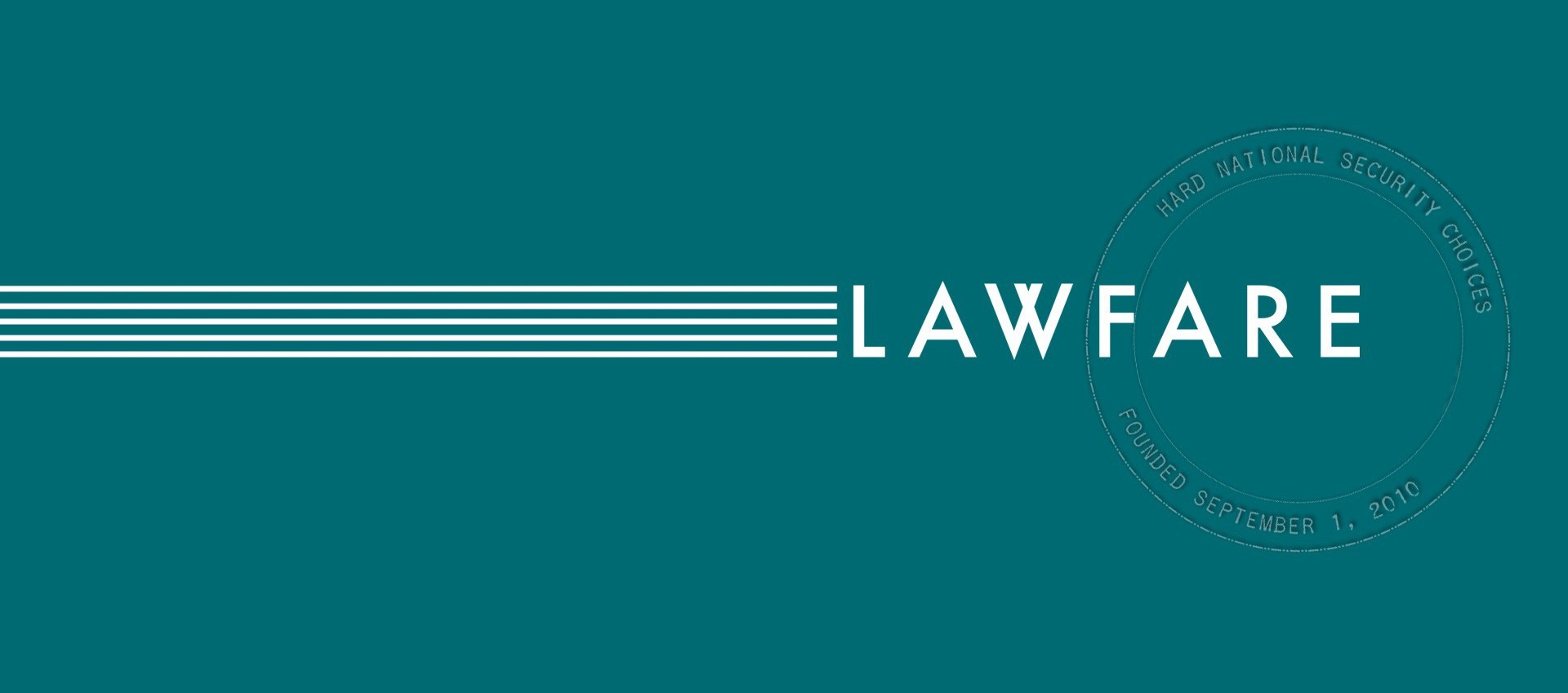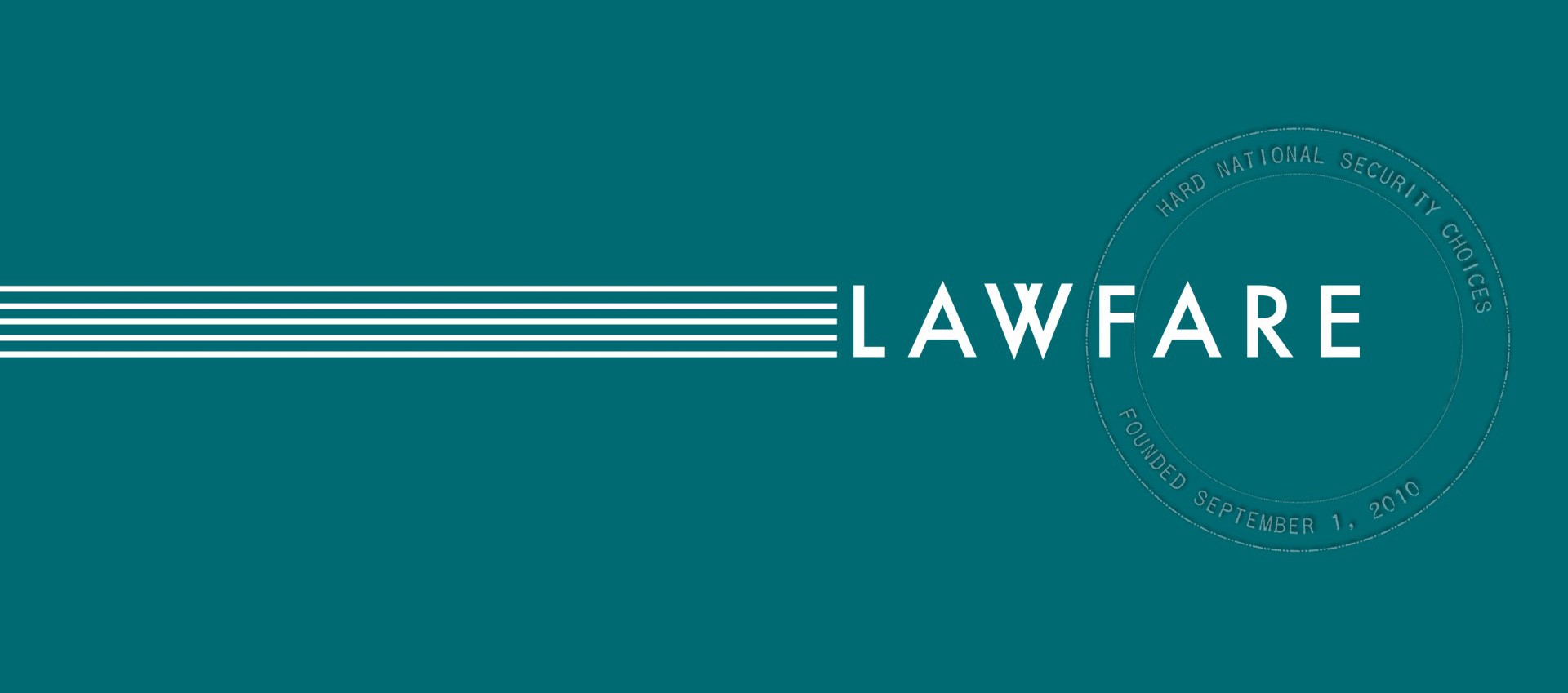Philip B. Heymann: An Essay on Domestic Surveillance (Lawfare Research Paper Series)
Lawfare is pleased to announce the publication of a new -- and timely -- paper in the Lawfare Research Paper Series: An Essay on Domestic Surveillance, by Philip B. Heymann, law professor at Harvard Law School and former Deputy Attorney General in the first Clinton Administration. (The paper can be found under the Special Features/Research Papers tab at the top of the Lawfare main page, where it is listed on the index of Lawfare Research Papers.
Published by The Lawfare Institute
in Cooperation With

Lawfare is pleased to announce the publication of a new -- and timely -- paper in the Lawfare Research Paper Series: An Essay on Domestic Surveillance, by Philip B. Heymann, law professor at Harvard Law School and former Deputy Attorney General in the first Clinton Administration. (The paper can be found under the Special Features/Research Papers tab at the top of the Lawfare main page, where it is listed on the index of Lawfare Research Papers. A pdf of the paper can be accessed directly here. The complete citation is: Philip B. Heymann, "An Essay on Domestic Surveillance," Lawfare Research Paper Series, Vol. 3, No. 2, May 10, 2015. The pdf still has some typos to be fixed and some citations to be added, so a revised version will be posted to take care of those. - Ed.) An Essay on Domestic Surveillance takes as its topic the broad 4th Amendment issues that the largely statutory analysis of the Second Circuit opinion in ACLU v. Clapper (May 7, 2015) does not reach. (Though, as several posts at Lawfare analyzing the opinion have pointed out, the opinion acknowledges and frames some of those 4th Amendment issues, in sometimes disputed ways):
The Second Circuit panel found it unnecessary to address the great difficulties and uncertainties of any general analysis of the constitutionality of the government’s claim of statutory authority under Section 215 [of the Patriot Act]. Yet it recognized that any new statutes addressing these issues will require addressing any 4th Amendment issues arising from them as well. What these 4th Amendment issues are, and how they might relate to the operations of any new or amended statutes, will both limit and clarify our options as a country and a society. These issues are the subjects of this essay.The Essay (drafted before the Second Circuit opinion came down, though Professor Heymann has added some brief framing materials with respect to it) addresses the larger 4th Amendment questions, as well as the broad social, political, and legal issues raised by new surveillance technologies. It is distinguished in part by an analysis of the problem created by new surveillance technologies and old categories of what legally is "not-a-search." But one of the most interesting features of the Essay is an affirmative proposal for how to address the problem posed by the intersection of new technology and old law -- Professor Heymann offers some sample statutory language as to how at least some of the problems might be fixed. An Essay on Domestic Surveillance is clearly timely with respect to the current debate over Section 215, but it is also important to the longer, larger debate over the protections of the 4th Amendment in our brave new techno-world. Below the fold is a part of the Conclusion:
The technological capacity for the U.S. government to know a great deal about almost every U.S. person – activities, friends, interests, and much more – is growing very rapidly. The possibilities come down to these:The first is very dangerous to our freedoms. The second is unlikely so long as we face international and domestic threats. The third is, for the moment, unavailable because of a half-dozen or so now-obsolete doctrines defining what is "not-a-search” and is therefore not subject to the centuries-old legal requirements of having (and in many cases showing a judge) a demonstrated and serious need for surveillance of a place, a communication, or a record -- that is, honoring reasonable expectations of privacy. These doctrines provide unregulated and unrestricted platforms – e.g., views from public places, records made and held by businesses or other associates, searches incident to an arrest, uninformed consent, etc. – for legally enabling government use of the vast increases of what can be observed with the newest technology. The Supreme Court has been narrowing these platforms by requiring a predicate and a warrant for any surprisingly broad or intrusive observations technology has made possible for them. This direction, if adopted in legislation as well as in court opinions, will not greatly burden our investigators in demanding a showing of real need for any expectedly broad or intrusive, technologically-enhanced surveillance. It would require only very traditional processes. That is a path well worth taking – indeed, it is one that may prove necessary in light of the Second Circuit’s opinion of May 7, 2015 in ACLU v. Clapper.
- The growth of surveillance will pose a threat to an individual’s sense of personal security and trust in the privacy of social and political relations; or
- Government self-restraint will contain it, however secretly new capacities are held; or
- Legal requirements to show a need for certain information will limit it, as has been true throughout much of our history since the adoption of the 4th Amendment.





